Governor Edward Coles (1786 - 1868)
"He Saved Illinois From the Curse of Slavery."
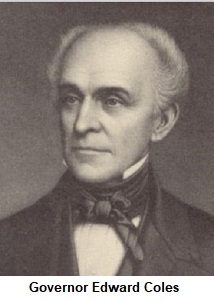
Edward Coles was born in 1786 in Albemarle County, Virginia. His
father was a Colonel in the army of the Revolution, and belonged to
one of the most distinguished families of the old Dominion. His
father was a friend and associate of Patrick Henry, Thomas
Jefferson, James Madison, Monroe, and other leading Virginia
statesmen, and it was in this atmosphere of greatness that young
Coles was brought up. Fitted for college by private tutors, he
completed his education at the college of William and Mary. After
leaving the institution, he spent two years in the study of history
and politics, and from his own reading and observation, became
imbued with views and principles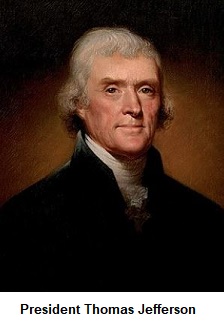
“The hour of emancipation is advancing with the march of time. It
will come, and whether brought about by the generous energy of our
own minds, or by the bloody process of San Domingo, is a leaf of our
history not yet turned over. As to the method by which this
difficult work is to be accomplished, if permitted to be done by
ourselves, I have seen no proposition so expedient on the whole as
that of the emancipation of those born after a given day, and of
their education and expatriation at a proper age.” Thomas Jefferson.
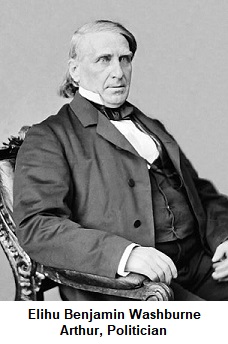
In 1815, Mr. Coles resigned his position as Secretary to the
President, and started on an exploring tour through the northwest,
in search of suitable lands on which to settle his slaves. He
traveled by buggy through Ohio, Indiana, and Illinois, and
finally, on reaching St. Louis, sent his horses back home by his
servant, and descended the Mississippi to New Orleans, and thence
returned by sea to Virginia. About the time of his arrival, a
serious misunderstanding arose between the United States and Russia,
and it became necessary to send a special ambassador to St.
Petersburg to smooth over the difficulties, if possible. President
Madison selected Mr. Coles for this important and delicate duty.
Although the latter was engaged in making arrangements to remove to
Illinois, he consented at the President’s earnest request, to accept
the mission. The man-of-war “Prometheus” was detailed to take Mr.
Coles to Russia, and was the first American naval vessel that ever
sailed up the Baltic. Mr. Coles’ mission was completely successful,
and after its conclusion, he visited the various countries of
Europe, all American Ministers and Consuls being directed by
government to show him special attentions. At Paris, he was the
guest a great part of the time of 2General LaFayette.
After his return to America, he continued his preparations for
removal to Illinois, and in 1818 spent the summer at Kaskaskia, in
attendance on the convention engaged in forming a constitution for
the new State, using his influence to prevent any recognition of
slavery in that instrument. Returning home, he started for Illinois
with all his slaves in the Spring of 1819, intending to free them
before reaching his destination. The moral heroism displayed in this
step has few parallels. Here was a young man, rich, honored,
accomplished, deliberately sundering all social, domestic, and
political ties for the sake of principle; abandoning home, fortune,
luxury, refinement, and a brilliant career for the benefit of his
slaves. In New England, there were, doubtless, at that time some
abolitionists, but they had become such through education in a
different school, and sacrificed nothing in holding anti-slavery
sentiments. But here was a man, born in the atmosphere of slavery,
inheriting a well-stocked plantation, who had become a practical,
not a theoretical, abolitionist, through the force of his own
convictions, and in opposition to his surroundings and to the social
and political ideas of his kindred and friends. But over that home
of ease and luxury was the “trail of the serpent,” and he shrank
from the pollution. He bore with him to Illinois a flattering letter
of introduction from President Monroe to Illinois Governor Ninian
Edwards.
Mr. Coles’ slaves knew nothing of their master’s intentions.
Journeying through Pennsylvania in wagons, they finally embarked in
flatboats on the Ohio River, and one lovely April day, while
floating down the broad river, he called all the servants together,
made them an address, told them his intentions, and then announced
that they were free, “free as himself,” and at liberty to go ashore
or proceed with him as they pleased. The slaves were transfixed with
astonishment, unable to realize the import of his words, but at
length they burst into tears and hysterical laughter, and in
tremulous voices gave vent to their gratitude, and implored the
blessing of heaven on their benefactor. It was a strange scene,
worthy the brush of a painter. All refused to leave him, expressing
the desire to remain as his servants until he was comfortably fixed
in his new home. He then announced his intention of giving to each
head of a family 160 acres of land, and starting them comfortably in
the world. This they refused, but he kept his word, and on arriving
at Edwardsville, gave each one a deed to 160 acres of land in the
vicinity of his own farm. [Note: Robert Crawford, one of the former
slaves, was given property in Knox County (which used to be part of
Madison County), near Galesburg, Illinois.
Crawford later sold the property and moved to Madison County.] Coles also executed to each an instrument of
emancipation, which was duly recorded. He prefaced each instrument
by setting forth that his father had bequeathed to him certain negro
slaves, and added: “Not believing that man can have of right a
property in his fellow man, but on the contrary, that all mankind
were endowed by nature with equal rights, I do therefore by these
presents restore to (naming the party) that inalienable liberty of
which he has been deprived.” It may not be out of place to add here,
that all the slaves thus freed proved themselves industrious and
useful members of the community, led creditable lives, and showed
themselves worthy of the generosity of their noble benefactor.
Soon after his settlement in
Madison County, President Monroe appointed Mr. Coles Registrar of the Land Office at Edwardsville, in which
position he soon formed an extended acquaintance, charming all by
his genial manners and winning address, aided likewise by the
prestige of his previous career at Washington, and reputation as a
successful diplomatist.
In 1822 occurred the election for a successor to Governor Bond. The
most prominent candidate was Chief Justice Phillips. Mr. Coles was
brought out in opposition, and developed such strength in the
southeastern part of the State, that Judge Browne was put in the
field to aid Phillips by taking votes from Coles. Subsequently,
General Moore was also brought out. Phillips and Browne were
intensely pro-slavery. After an exciting contest, the election
resulted in 2,810 votes for Coles; 2,760 for Phillips; 2,543 for
Browne, and 522 for Moore; Coles receiving a plurality of 50 votes
over Phillips. The result showed that the candidacy of Browne
defeated Phillips. The aggregate vote was largely in favor of
slavery, Mr. Coles being elected by the division among the
pro-slavery men. The pro-slavery men elected their candidate for
Lieutenant Governor, Hubbard, by a large majority, and had nearly a
two-thirds majority in the legislature.
Governor Coles’ inaugural message was an admirable and far-seeing
document, filled with wise and statesmanlike recommendations. He
advocated the adoption of a sound financial policy; the development
of the agricultural resources of the State; the construction of a
canal connecting Lake Michigan and the Mississippi; the advancement
of education; and implored the Legislature to abrogate the remnant
of slavery that existed in the State, and also pass just and humane
laws in regard to the negroes. The anti-slavery recommendations had
the effect of the explosion of a bombshell on the pro-slaveryites. A
large majority of the inhabitants of the State were from the south,
and warm friends of slavery. They were thoroughly alarmed by the
message, and resolved to strike for a new constitution that should
permit slavery in the State. In explanation of the situation, Mr.
Washburne says:
“The first Illinois constitution prohibited slavery, and it may be asked how
it was possible that it could exist in Illinois at that time.
Illinois was a slave territory before it was ceded to the United
States by Virginia. The deed of cession provided that ‘the
inhabitants of the territory should have their possessions and
titles confirmed to them, and be protected in their rights and
liberties.’ This deed of cession was executed March 01, 1784. On July
13, 1787, Congress passed the ordinance providing that there should
be neither slavery nor involuntary servitude in the northwestern
territory. But the pro-slaveryites contended that this ordinance of
1787 was in conflict with the deed of cession, and therefore of no
binding effect.”
The early French inhabitants had held slaves, and still claimed that
right as did certain other settlers from the southern States, and
the census of 1820 showed that there were then 917 negroes held as
slaves in the State.
The Legislature at once appointed a committee on that portion of the
Governor’s message relating to slavery, which committee reported
that “the people of Illinois have now the same right to alter their
constitution as the people of Virginia, or any of the original
States, and may make any disposition of negro slaves they choose
without breach of faith or violation of ordinances, or act of
Congress,” and recommended the calling of a convention to alter the
constitution of the State.
The history of the struggle which then followed to fasten slavery on
the State is of intense interest, and we regret having to condense
it into a brief statement, leaving out details, and presenting only
the salient points. Under the existing constitution, no chance could
be made in that instrument, unless submitted to the people by a
two-thirds vote of the Legislature. The pro-slavery men had
two-thirds majority in the Senate, but lacked one vote of having
two-thirds in the House. And then commenced a campaign of
unparalleled rancor and bitterness. The anti-slavery minority,
animated by a love of freedom and supported vigorously by Governor
Coles, fought against the convention resolution with heroic
boldness and resolution. They stood a Spartan phalanx, unmoved by
threats and intimidation, resisting bribes and persuasion; rising
superior to public clamor, defying a multitudinous lobby influence
gathered at Vandalia from all parts of the State, and smiling
contemptuously at the curses and denunciations showered upon them.
The pro-slaveryites were at their wits’ ends. Failing to accomplish
their object by fair means, they resorted to foul ones. At the
opening of the session, before the convention resolution came up,
there had been a contested election case from Pike County - John Shaw and
Nicholas Hansen both claiming the seat from that county. The contest
was decided in favor of Hansen. The pro-slavery men, after weeks of
wrangling, thought they had obtained the requisite number of votes,
but when the matter came to a vote, Hansen, whom they had counted on
their side, voted against calling a convention. The pro-slavery men
were wild with chagrin and mortification. In their desperation, they
resorted to an outrageous act of injustice and stultification. They,
without any grounds whatever, reconsidered their vote on the
contested election case, unseated Hansen after he had been nine
weeks a member of that body, and seated Shaw. To accomplish their
ends, they violated every law of justice and rode rough shod over
all the rules of parliamentary procedure. Shaw was their pliant
tool. He voted for a convention, and by his aid, the requisite
two-thirds vote was obtained. But this act of Legislative injustice
returned to plague the inventors, and doubtless, in the subsequent
election, cost them the votes of hundreds of fair minded, although
pro-slavery men, who believed that the call for the convention was
illegally issued.
The convention men from all parts of the State were delirious with
joy over their triumph. They assembled in a grand procession,
paraded the streets of Vandalia, insulting Governor Coles and all
their principal opponents, and held a mad carnival of riot and
uproar. The object was to crush out at once all opposition. The
outlook was gloomy enough. There seemed no doubt but what the
resolution would be carried by the people, but the heroic Governor
Coles and the gallant anti-convention members resolved to fight the
issue out to the bitter end. As soon as the Legislature adjourned,
the Governor invited the anti-convention men to a consultation. They
determined upon immediate organization to fight against the
conspiracy to make Illinois a slave State. An address to the people
was prepared by Governor Coles, and signed by those members of the
Legislature who voted against the convention. This address, Mr.
Washburne says, “unmasked the purposes of the conspirators to make a
slave constitution, and exposed the disgraceful means used to
accomplish their purposes. It was an impassioned appeal to the
people to arise in their might and save the State from the impending
shame and disaster.” Speaking of slavery, Governor Coles' address said:
“What a strange spectacle would be presented to the civilized world
to see the people of Illinois, yet innocent of this great national
sin, and in the full enjoyment of all the blessings of free
government, sitting down in solemn convention to determine whether
they should introduce among them a portion of their fellow beings to
be cut off from these blessings, to be loaded with the chains of
bondage, and rendered unable to leave any other legacy to their
posterity than the inheritance of their own servitude. The wise and
the good of all nations would blush at our political depravity. Our
professions of Republicanism and equal freedom would incur the
derision of despots and the scorn and reproach of tyrants. We should
write the epitaph of free government upon its tombstone.”
“After dwelling,” Mr. Washburne says, “upon the moral aspects of
slavery, and arguing against its introduction as inexpedient for
material and economic reasons, the appeal closes with the following
stirring words by Governor Coles:”
“In the name of unborn millions who will rise up after us and call
us blessed or accursed according to our deeds, in the name of the
injured sons of Africa, whose claims to equal rights with their
fellow men will plead their own cause against their oppressors at
the tribunal of eternal justice, we conjure you, fellow citizens, to
ponder upon these things!”
This eloquent and thrilling appeal was signed by fifteen members of
the Legislature, dauntless, defiant, true-hearted men. They were:
3Risdon Moore, William Kinkade, George Cadwell, Andrew Bankson,
Jacob Ogle, Curtiss Blakeman (Madison County), Abraham Cairnes,
William Lowery, James Sims, Daniel Parker, 4George Churchill
(Madison County), Gilbert T. Pell, David McGahey, Stephen Stillman,
and Thomas Mather. Four other members of the Legislature voted against
the convention resolution, viz: Robert Frazier, Raphael Widen, J. H.
Pugh, and Nicholas Hansen (expelled to make place for Shaw). Their
names were not affixed to the appeal, probably because they had left
Vandalia before it was prepared. To sign this appeal required an
amount of moral courage and stamina, hard to appreciate at this day.
Issuing it in the face of a large pro-slavery majority in the State,
the signers not only risked their own political future, but exposed
themselves to social and business ostracism. As a sample of the
rampant pro-slavery spirit of the time, two of these signers, Risdon
Moore and George Churchill, were burned in effigy at Troy, Madison
County, for their anti-slavery sentiments. The signers to this
appeal, who fought the anti-slavery battle in this State, and did
more for Illinois and humanity than even themselves realized, are
worthy of the eternal gratitude of lovers of liberty everywhere.
The pro-slavery convention men also issued an address to the people,
prepared by a committee appointed at a public meeting of which
Colonel Thomas Cox of Sangamon was chairman. The signers were John
McLean, afterwards U. S. Senator; Judge T. W. Smith and Emanuel J.
West, both of Madison County; Thomas Reynolds, William Kinney,
Colonel A. P. Field, and Joseph A. Baird. The address endorsed the
action of the Legislature, and advocated the amendment of the
constitution. This document was a weak and tame manifesto compared
with the bold and eloquent appeal of the anti-slavery men. The issue
was now joined, February 1823, and both parties prepared for a
conflict which for the next 18 months, shook the State from center
to circumference, divided families, made enemies of friends, filled
the air with recrimination, and nearly resulted in civil war. Under
the constitution, the vote could not be taken on the convention
resolution until August 1824, when the next General Assembly was
elected, so that there was ample time for preparation. Both sides
were bitter, determined, and defiant. No quarter was given or asked.
Governor Ford in his history says:
“Newspapers, handbills, and pamphlets were thrown broad cast. These
missive weapons of a fiery contest were scattered everywhere, and
everywhere they scorched and scathed as they flew. The whole people,
for the space of months, did scarcely anything but read newspapers,
handbills, and pamphlets, quarrel, wrangle and argue with each other
whenever they met to hear the violent harangues of their orators.”
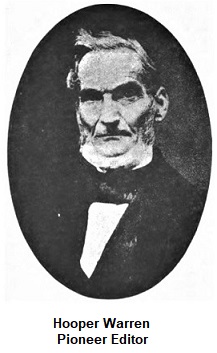
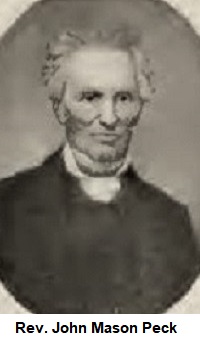 turned its
batteries against the convention. Next to Governor Coles, the man
who probably did the most effective work against the convention was
the 6Rev. John M. Peck, the great Baptist preacher [who founded the
Shurtleff College in Upper Alton], who labored assiduously in the
cause throughout the campaign. He organized the religious element on
the anti-slavery side, and under his inspiration, the pulpit
thundered anathemas against the convention. He organized societies
in fourteen counties under the control of a parent society at his
home in St. Clair. He traveled constantly, preaching a crusade
against slavery. Next to Mr. Peck, in good work accomplished, was
Morris Birbeck of Edwards County, a talented, highly educated
Englishman, a man of note and standing in his own country. He had
become acquainted with Governor Coles in England, and immigrating to
Illinois, he enlisted heart and soul with the Governor in the great
work. Upon the solicitation of Governor Coles, he employed his ready
pen continuously in the preparation of anti-slavery documents, and
in contributions to the newspapers. Of many others who took an
active part against the convention, especial mention should be made
of Judge Samuel D. Lockwood, David Blackwell, J. H. Pugh, George
Forquer, Daniel P. Cook, Thomas Mather, Henry Eddy, George
Churchill, 7Thomas Lippincott, Hooper Warren, and 8Curtiss Blakeman,
the last four of Madison County.
turned its
batteries against the convention. Next to Governor Coles, the man
who probably did the most effective work against the convention was
the 6Rev. John M. Peck, the great Baptist preacher [who founded the
Shurtleff College in Upper Alton], who labored assiduously in the
cause throughout the campaign. He organized the religious element on
the anti-slavery side, and under his inspiration, the pulpit
thundered anathemas against the convention. He organized societies
in fourteen counties under the control of a parent society at his
home in St. Clair. He traveled constantly, preaching a crusade
against slavery. Next to Mr. Peck, in good work accomplished, was
Morris Birbeck of Edwards County, a talented, highly educated
Englishman, a man of note and standing in his own country. He had
become acquainted with Governor Coles in England, and immigrating to
Illinois, he enlisted heart and soul with the Governor in the great
work. Upon the solicitation of Governor Coles, he employed his ready
pen continuously in the preparation of anti-slavery documents, and
in contributions to the newspapers. Of many others who took an
active part against the convention, especial mention should be made
of Judge Samuel D. Lockwood, David Blackwell, J. H. Pugh, George
Forquer, Daniel P. Cook, Thomas Mather, Henry Eddy, George
Churchill, 7Thomas Lippincott, Hooper Warren, and 8Curtiss Blakeman,
the last four of Madison County.
We will not dwell longer on the contest. The day of election came,
and the vote resulted:
Against the convention – 6,822
For the convention – 4, 950
Majority against – 1,872
Madison County voted:
Against the convention – 563
For the convention – 351
Majority against – 212
The attempt to amend the constitution was thus defeated, and
Illinois was saved from the leprosy of slavery. To Governor Coles
and his noble co-adjutors be all honor and praise. They “built
better than they knew,” and to them is due the fact that Illinois is
now the Empire State of the West, the peer of any State in the Union
in wealth, in prosperity and material development, and the home of
an educated, liberty-loving, happy people. And in the great national
struggle for liberty [Civil War], which opened 36 years later, under
another son of Illinois, Abraham Lincoln, there were no braver
soldiers than the sons of the anti-convention leaders, who rallied
under Governor Coles.
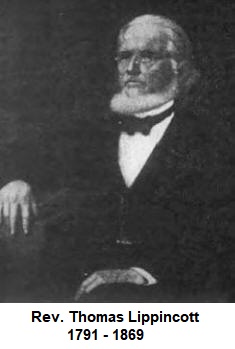
Throughout the remainder of his term, Governor Coles labored
zealously for the development and prosperity of the State, the
advancement of the cause of education, and the general welfare of
the people. In 1825, General LaFayette visited the United States,
and was received at Kaskaskia by Governor Coles, whose acquaintance
he had formed seven years before in Paris, and welcomed to Illinois.
The personal correspondence of these two great men, between whom
there existed a warm, personal friendship, is of great interest.
Governor Coles delivered his valedictory message to the Legislature
in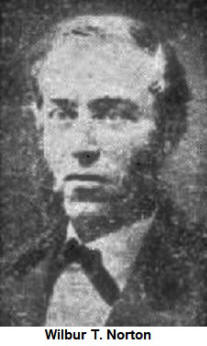
In 1832, Governor Coles removed permanently to Philadelphia, where
he was married in 1833 to Miss Sallie Logan Roberts. He never again
entered political life, but always took much interest in public
affairs. Mr. Washburne says: “Possessed of an ample fortune, his
private life seems to have brought him every charm and surrounded
him with every happiness. In person, he was about six feet in
height, and possessed a countenance of rare beauty. He lived
honored, respected, and beloved, to the good old age of 82, dying in
1868 after many years of feebleness. He was buried at Woodland near
Philadelphia.”
Governor Coles lived to see the nation redeemed from the curse from
which he saved the Prairie State. His widow, his oldest son, Edward
Coles Jr., and a daughter survive him and reside in Philadelphia. It is
an aphorism that “the world knows little of its greatest men.” Mr.
Washburne’s book, in enlightening the people of Illinois in regard
to the life and character of the man to whom they owe so much of
their present prosperity and happiness, will add new laurels to the
fame of its distinguished author.
Signed 9Wilbur T. Norton
**********
1Hon. Elihu B. Washburne (1816-1887) became a leader of the Radical
Republicans – those most ardently opposed to slavery, and was among
the original proponents of racial equality. After the Civil War,
Washburne advocated that large plantations be divided up to provide
compensatory property for freed slaves. He served as a member of the
House of Representatives from Illinois, was the 25th U. S. Secretary
of State, and was the U. S. Minister to France. In 1882, after he
retired, he published a biography [much of which the above
information was taken from] of former Illinois governor Edwards
Coles and the anti-slavery movement. Washburne moved to Chicago, and
served as president of the Chicago Historical Society from 1884 to
1887. In 1887, he published his memoir of his time as a diplomat.
His son, Hempstead, was elected Mayor of Chicago in 1891. Elihu
Washburne died at his son home in Chicago on October 22, 1887. He
was buried at Greenwood Cemetery in Galena.
2General LaFayette (1757-1834) was a French aristocrat and military
officer who fought in the American Revolutionary War, commanding
American troops in several battles, including the Siege of Yorktown.
After returning to France, he was a key figure in the French
Revolution of 1789, and the July Revolution of 1830. LaFayette was
commissioned an office at the age of 13. He became convinced that
the American revolutionary cause was noble, and traveled to the New
World seeking glory in it. He was made a Major General at age 19. He
was wounded during the Battle of Brandywine, but still managed to
organize an orderly retreat, and served with distinction in the
Battle of Rhode Island. In the middle of the war, he sailed home to
lobby for an increase in French support. He returned to America in
1780, and was given senior positions in the Continental Army. In
1781, troops under his command in Virginia blocked forces led by
Cornwallis, until other American and French forces could position
themselves for the decisive Siege of Yorktown. He returned to
France, and was elected a member of the Estates General of 1789.
3Risdon Moore (1760-1828) served in the Revolutionary War, as did
his brothers, Thomas and William. Risdon was the only one of three
brothers to survive the war. He served in Georgia Legislature in
1010, when he made a remark to an African-American during a class
meeting, “When dead, he would be free!” Because of this comment,
Risdon was indicted in Hancock County. Risdon sent his eldest son,
William, to Illinois to find “A more free and purer atmosphere.” He
and his family moved to Belleville, Illinois in 1812. He brought
with him sixteen slaves, in hopes of setting them free. As soon as
the slaves become of age, they were “allowed to look out for
themselves and use their own earnings.” Risdon served in the
Illinois government as the Speaker of the House of Representatives
in 1814, and was a member of the first, third, and fourth
legislatures. He was strongly opposed to making Illinois a slave
State.
4George Churchill (1789-1872) moved from St. Louis to Troy,
Illinois, in about 1817. He was a writer of great ability, and
amassed a large library concerning the early history of Madison
County. He became part owner, with Hooper Warren, of the
Edwardsville Spectator. In 1822, he was elected to represent Madison
County in the Illinois General Assembly. When the call came to hold
a convention for a new Illinois constitution, he put pen to paper
and wrote articles that “burned through the cuticle of ignorance and
sophistry.” He also served in the Illinois Senate.
5Hooper Warren (1790-1864) learned the printer’s trade with Horace
Greeley. He entered the field of journalism in Frankfort, Kentucky,
and then in St. Louis, where he worked at the Missouri Gazette.
Under the tutelage of Governor Edwards, he established the
Edwardsville Spectator in 1819. This was the third Illinois
newspaper. George Churchill later joined Warren as co-owner. Warren
was the most unrelenting foe to slavery that ever lived in Illinois.
A distinction was drawn between Lovejoy’s observers by stating
Warren was anti-slavery, while Lovejoy was an abolitionist. In 1825,
Warren severed his connection with the Spectator, and moved to
Springfield. He founded the Sangamon Spectator in 1827. He was a
quiet man, and never gave public speeches. He was a good listener
with sound judgment, kind a tender-hearted. In 1812 he married Mary
Damson. He took ill in 1864 in Chicago, and died a few days later.
6Rev. John M. Peck (1789-1858) was an American Baptist missionary to
the western frontier of America. He, along with Rev. James Ely
Welch, established the First Baptist Church of St. Louis. In 1818,
he traveled to Kaskaskia, then the seat of government in Illinois.
In 1819, Peck set out to establish a seminary. At the end of April
1822, he and his family moved to St. Clair County, Illinois, and
founded Rock Spring Seminary, named after his farm. In 1832 he moved
the seminary to Upper Alton, and renamed it Shurtleff College after
a benefactor, Benjamin Shurtleff. Rev. Peck was considered an
innovator, with great zeal, power, and success. He was firmly
against slavery, and preached against it in his papers and sermons.
7Rev. Thomas Lippincott (1791-1869) moved to New York to St. Louis,
Missouri in 1819. He first worked as a clerk, and Colonel Rufus
Easton, founder of Alton, asked him to take goods and establish a
store in his newly founded town. Thomas loaded the goods onto a
boat, where he disembarked at Alton. He chose, however, to set up
the store in Milton, near the Wood River, which was more populated
at the time. After loosing two wives at Milton, from the malarial
fever, he moved to Edwardsville to get away from the unhealthy
climate. In 1822, he was elected as secretary of the Illinois State
Senate, and also became editor of the Edwardsville Spectator.
Through the newspaper and his public life, he took every opportunity
to aid in the struggle over slavery. Lippincott opposed calling for
a convention for a new Illinois constitution, and wrote some of the
most influential articles on the subject, which contributed to the
victory won by his party.
8Curtiss Blakeman (1777-1833) was a former sea captain from
Stratford, Connecticut, who settled in Marine, Madison County in
1819. He was elected to the third General Assembly of Illinois,
which convened at Vandalia on December 2, 1822. In 1824, he was
re-elected to the General Assembly. He was considered full of
practical wisdom, gained by life-long voyaging from land to land. He
was firm as a rock in the maintenance of right, and was firmly
against slavery.
9Wilbur T. Norton (1844-1925) was born in Alton and served in the
Civil War. He became editor and proprietor of the Alton Telegraph,
and later postmaster in Alton. As a newspaper man, he was devoted to
chronicling facts of historic nature, including writing the
Centennial History of Madison County, Illinois, and Its People.” He
died in 1925 in Alton, and was buried there.
Source: Alton Telegraph, December 8, 1881